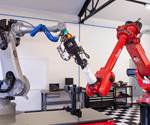Arris Composites raises funding for high-speed composites manufacturing
The new proprietary process is said to produce low-cost carbon fiber composites for aerospace, automotive and other industries.
Arris Composites (Berkeley, Calif., U.S.) has announced it has closed $10 million in Series A funding, led by NEA, for its continuous carbon fiber manufacturing process. Arris has spent the past two years in stealth developing composites for aerospace, automotive and consumer applications.
Arris has not disclosed details of its new process yet, but it says its team of industry leaders from both 3D printing and conventional high-volume manufacturing has developed a new high-speed manufacturing process to produce precisely aligned composites.
Through its proprietary manufacturing process, Arris says it is developing continuous carbon fiber parts that outperform 3D-printed metal and composite aerospace parts in structural properties, minimum feature size and manufacturing cost. While these parts can be produced with resins and fibers approved for aerospace, Arris also uses low-cost glass fibers and resins that are widely used in automotive and consumer products.
“I’m extremely excited about what Arris is building,” says Jeff Immelt, venture partner at NEA, and former CEO and chairman of GE. “What we did in automotive to replace non-structural metal with low cost/lightweight injection molded composites in the 1980’s, Arris has now enabled for the rest of the vehicle.”
“The product architectures that are now possible with our high-volume manufacturing process unlock a host of competitive advantages for some of the highest revenue and highest value products in the world,” says Ethan Escowitz, founder and CEO of Arris Composites. “Vehicles and consumer products are being redesigned to take advantage of the mass market manufacturing technology of tomorrow. Things are about to get lighter and smaller, and Arris is making that a reality.”
Related Content
-
The potential for thermoplastic composite nacelles
Collins Aerospace draws on global team, decades of experience to demonstrate large, curved AFP and welded structures for the next generation of aircraft.
-
Carbon fiber, bionic design achieve peak performance in race-ready production vehicle
Porsche worked with Action Composites to design and manufacture an innovative carbon fiber safety cage option to lightweight one of its series race vehicles, built in a one-shot compression molding process.
-
A new era for ceramic matrix composites
CMC is expanding, with new fiber production in Europe, faster processes and higher temperature materials enabling applications for industry, hypersonics and New Space.

.jpg;width=70;height=70;mode=crop)














